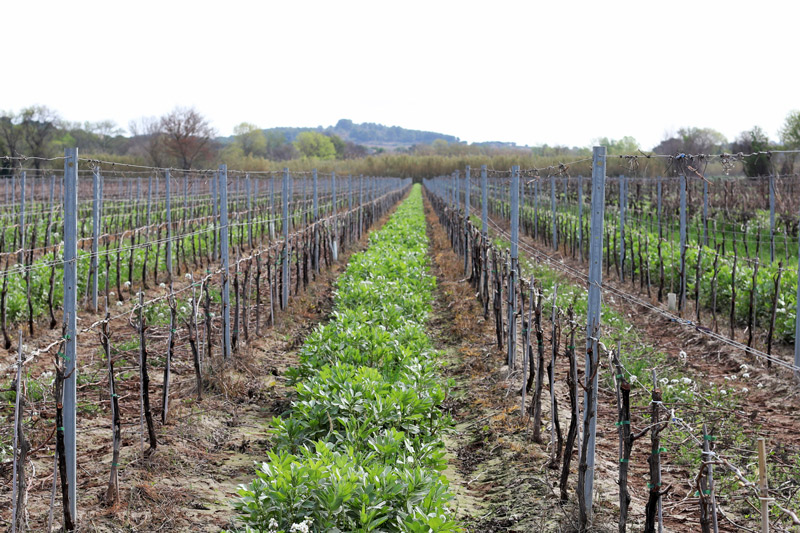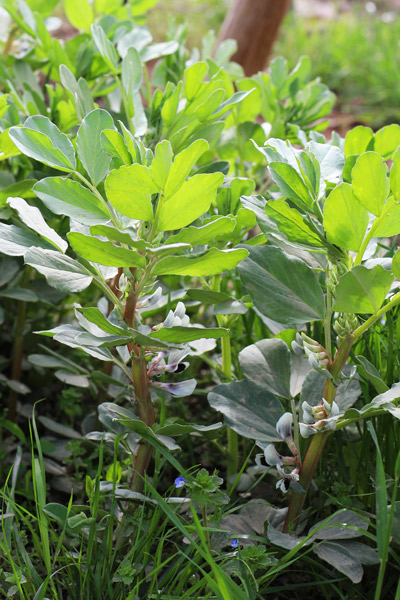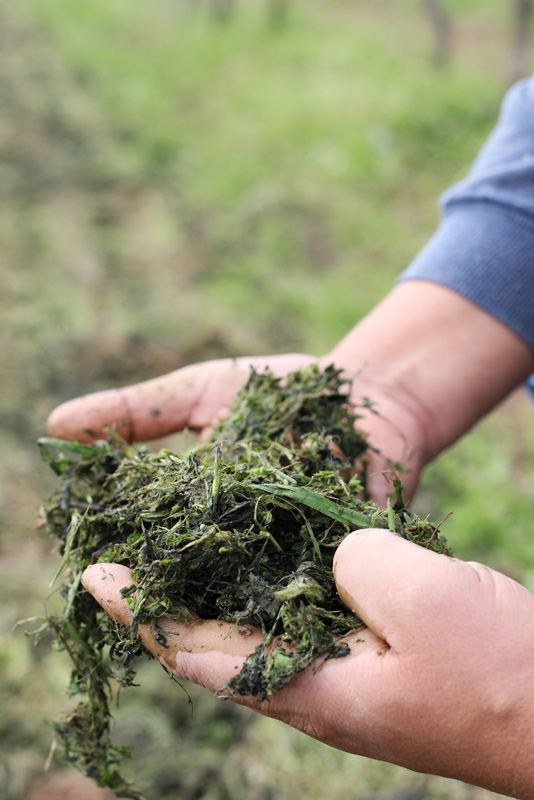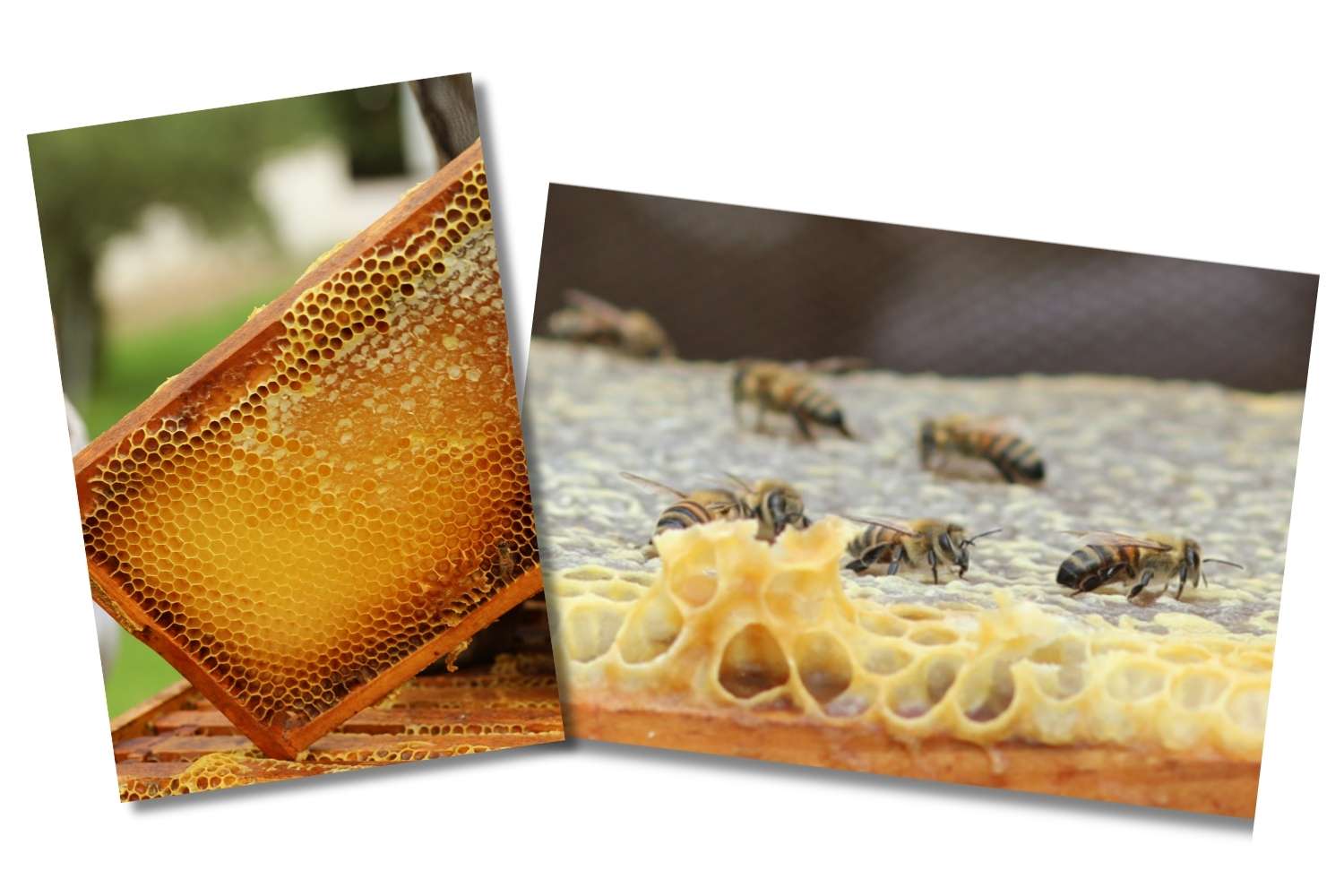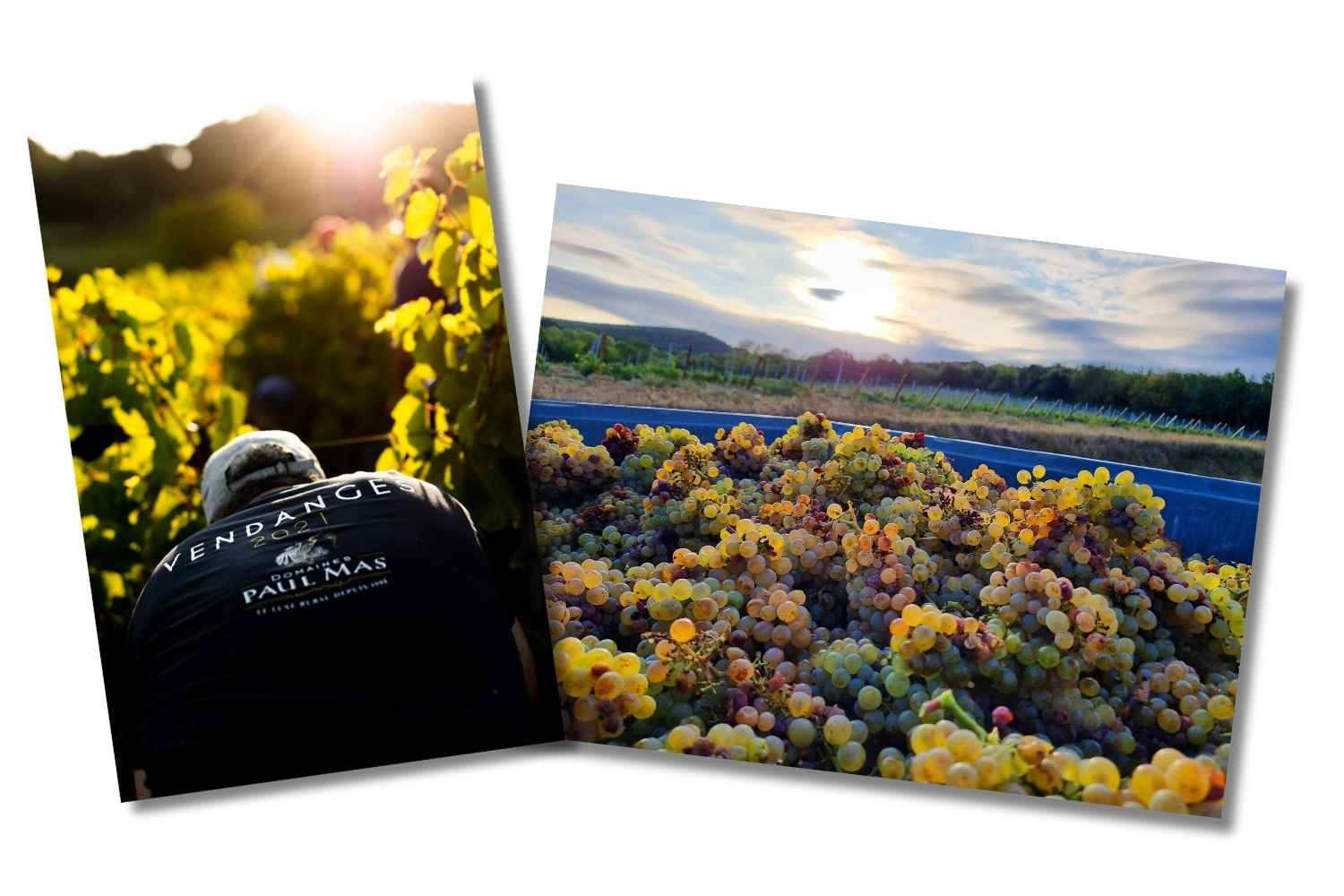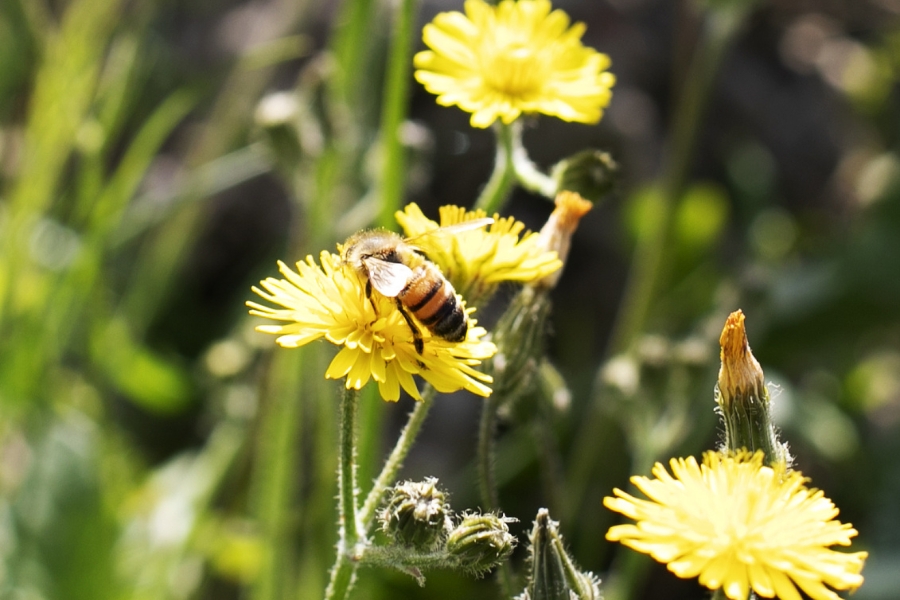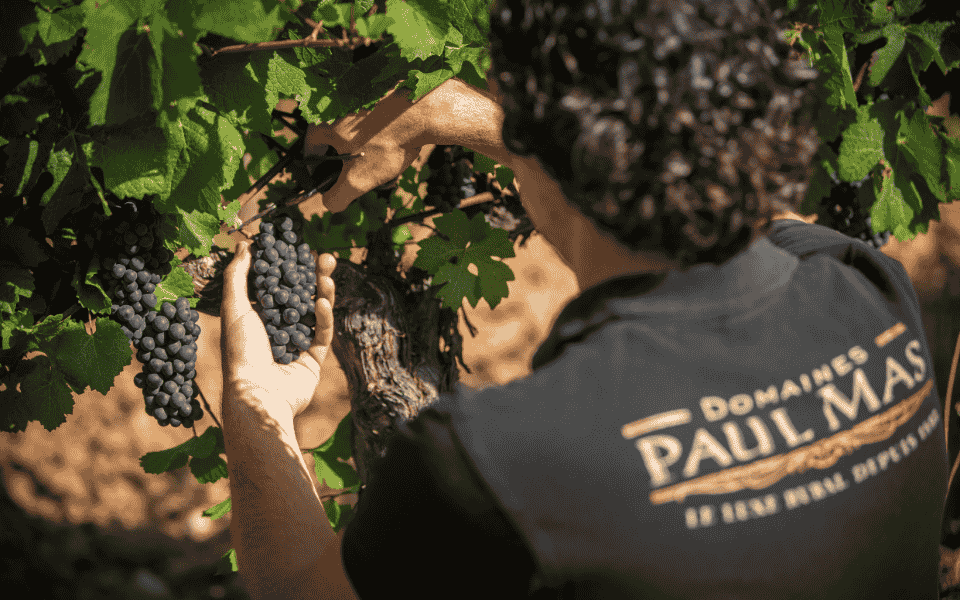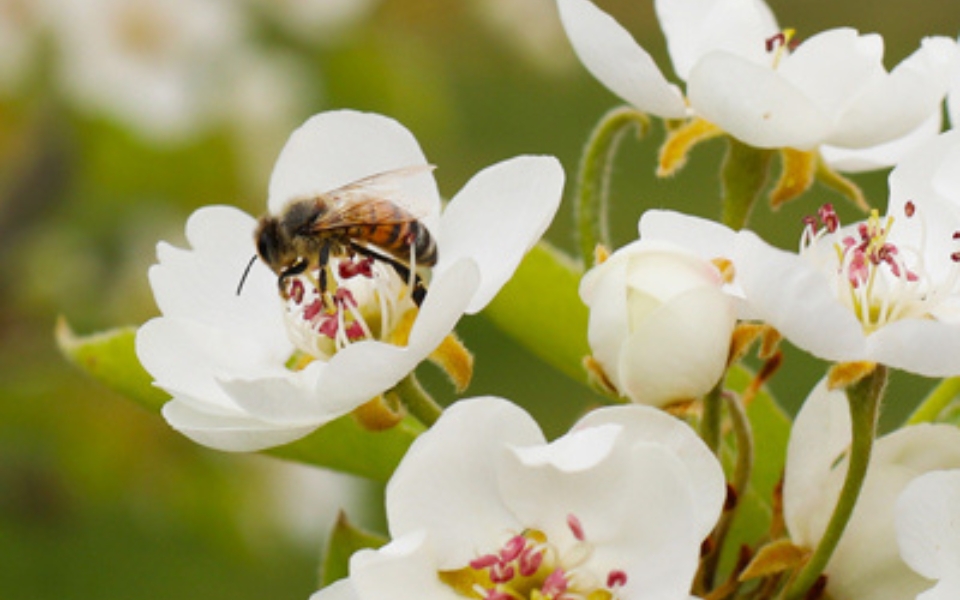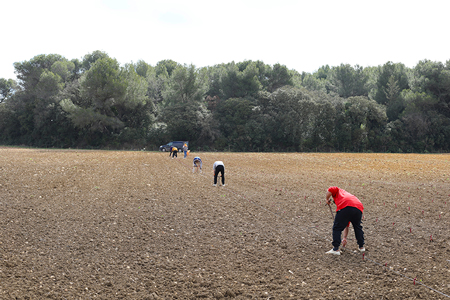

Sustainable viticulture:
The secrets of broad bean for wines of excellence

The race is on in the vineyards! The last few days have been very active in our Hérault vineyards. With 30 mm of rain falling on March 08 and 09, followed by fine sunny days, our broad bean crops have flourished! These precious beans have grown simultaneously with the budding of the vines, while the buds are in full expansion.
It’s high time to crush the broad bean to provide our vines with essential nutrients for their growth, the formation of quality grapes and, ultimately, the production of exceptional vintages!
Why this race against time? What are the advantages of using broad beans as a green manure? We explain it all in this article!
What are the benefits of using Broad Bean as a cover crop?
Why is grass cover and the use of broad beans increasingly important in sustainable viticultural practices?
Viticulture is moving towards more sustainable and environmentally friendly practices, highlighting the crucial importance of grassing and the use of broad beans as a ground cover in vineyards. Broad bean, a plant with many virtues, is proving to be an invaluable ally for those of us concerned about the health of our vines, yield, and grape quality. As a natural green manure, broad bean brings significant agronomic benefits by providing the vines with the nitrogen essential for optimal development. In addition to its nutritional properties, broad bean also promotes biodiversity and contributes to soil preservation by limiting erosion.
BROAD BEAN
➡️ A natural, high-performance green manure
La féverole est une légumineuse capable de capter l’azote atmosphérique et de le restituer au sol. C’est un excellent engrais vert, 100% naturel et renouvelable, qui permet d’améliorer la fertilité de nos sols.
➡️ Broad bean is a legume capable of capturing atmospheric nitrogen and returning it to the soil. It’s an excellent green manure, 100% natural and renewable, and helps improve soil fertility.
Broad bean has many benefits for vineyards:
- Nitrogen: supplies the vines with the nitrogen they need for vigorous growth and optimal grape production.
- Soil structure: its deep root system helps structure the soil and improve drainage.
- Organic matter: as it decomposes, broad bean enriches the soil with organic matter, improving water retention and fertility.
- Biodiversity: it attracts beneficial insects and promotes biodiversity in the vineyard.
➡️ Un atout pour l’environnement
An asset to the environment:
- Reduce the use of chemical fertilizers: an asset for environmental protection and water quality.
- Reduce the vineyard’s carbon footprint.
➡️ A sustainable choice for the future
Broad bean fits perfectly into a sustainable, environmentally friendly approach to agriculture. It’s an invaluable tool for us who want to produce quality wines while preserving the soil and biodiversity.
Broad bean: what are the agronomic advantages?
Broad bean stands out for its many agronomic advantages, making it a preferred choice as a green manure for vines, offering significant benefits for vine health, yield and grape quality.
- Essential nitrogen contribution
Broad bean’s ability to fix atmospheric nitrogen in the soil makes it a natural and valuable source of nitrogen for vines. Broad bean’s ability to fix nitrogen in the soil enables vine roots to draw on this essential nutrient, promoting optimal development. Nitrogen plays a crucial role in vine growth, stimulating the formation of robust shoots and vigorous vegetation.
- Stimulating vegetative growth
At bud-break, as vines enter an active growth phase, they need more nutrients to support their development. The presence of broad beans as a plant cover provides the vine with the nutrients it needs to promote vigorous vegetative growth. This growth stimulation helps to boost vine vigor, leading to the production of larger, fuller shoots.
- Improving grape yield and quality
Thanks to its beneficial effect on vine health and development, broad bean plays a key role in improving wine yields. Healthier, more vigorous vines generally produce better-quality grapes. Thus, the use of broad beans as a green manure has a positive impact on overall vineyard yield and on the quality of the grapes harvested.
Broad bean: what impact on grape quality and vine health?
The use of broad beans as a cover crop in vineyards has a significant impact on grape quality and vine health.
- Improved vine health
The presence of broad beans as a plant cover promotes better vine health by providing an environment conducive to vine development. By acting as a source of nitrogen and stimulating vegetative growth, broad beans enhance vine vigor, helping them to withstand environmental stress and maintain optimal physiological balance. Healthier vines are more resistant to disease and adverse weather conditions, resulting in healthier, higher-quality grapes.
- Enrichment in nutritive and aromatic compounds
The presence of broad beans as a green manure in vineyards helps enrich grapes with essential nutrient compounds. By promoting balanced, vigorous vine growth, broad bean ensures that grapes receive an adequate supply of nutrients, which is reflected in their chemical composition. Grapes fed in a natural, balanced way have a higher concentration of sugars, acids, polyphenols, and other aromatic compounds, contributing to the production of complex, expressive wines.
Broad bean semi-sowing: what’s in it for the soil and biodiversity?
Broad bean, as a plant cover in vineyards, establishes an essential symbiosis with soil bacteria, promoting atmospheric nitrogen fixation and enriching the soil with nutrients crucial to vine health.
- Atmospheric nitrogen fixation
Broad bean’s unique ability to establish a symbiotic relationship with bacteria present in the soil. This beneficial association takes place in the nodosities, small white balls visible on broad bean roots. In these nodules, the plant supplies carbonaceous substances to the bacteria, which in turn fix and transform atmospheric nitrogen into a form that can be assimilated by the plant. This process of atmospheric nitrogen fixation by broad bean is a natural and sustainable mechanism for enriching the soil with nitrogen, providing vines with a natural, balanced fertilizer for their growth.
- Enriching the soil with nutrients
The symbiosis between broad bean and soil bacteria not only fixes atmospheric nitrogen, but also enriches the soil with essential nutrients. Thanks to this “win-win” association, broad bean helps improve soil fertility by providing nutrients necessary for plant growth. The biological activity stimulated by the presence of broad beans as a plant cover stimulates underground biodiversity and helps maintain an ecological balance conducive to the harmonious development of crops.
Broad bean, what impact on soil water management?
The impact of broad bean plant cover on soil water management is essential for the preservation of terroir, helping to prevent erosion, improve soil structure and ensure efficient water management in vineyards.
- Erosion prevention
Broad bean plant cover plays a crucial role in preventing soil erosion. By covering the soil and forming a dense ground cover, broad bean limits the impact of bad weather and runoff, thus preventing soil erosion. This plant cover acts as a natural barrier, holding soil in place and preserving soil structure, essential for maintaining its fertility and ability to support crops.
- Improves soil structure
By rooting deeply into the soil, broad beans help to improve their structure by promoting aeration and porosity. Broad beans’ powerful roots act as structuring agents, allowing better infiltration of water and nutrients into the soil. This beneficial action encourages the development of a microfauna beneficial to the soil, contributing to its long-term health and fertility.
- Preservation of the terroir
The effective water management of soils by broad bean vegetation not only limits erosion and improves soil structure, but also preserves the terroir. By maintaining soil integrity and promoting sustainable water management, broad bean helps maintain the unique terroir characteristics essential to the quality and identity of our wines. In this way, the practice is part of an approach that preserves the environment and enhances the specific characteristics of the terroir.
In conclusion: What are the advantages of using broad beans as a cover crop?
The use of broad beans as a cover crop in our vineyards offers a multitude of specific advantages and concrete benefits that make it an essential practice for sustainable, environmentally friendly viticulture.
Its many specific advantages make it an invaluable ally for winegrowers keen to produce quality wines while preserving soil health and surrounding biodiversity.

